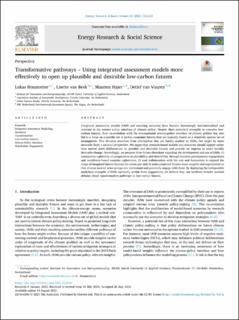Please use this identifier to cite or link to this item:
https://doi.org/10.21256/zhaw-23072Full metadata record
| DC Field | Value | Language |
|---|---|---|
| dc.contributor.author | Braunreiter, Lukas | - |
| dc.contributor.author | van Beek, Lisette | - |
| dc.contributor.author | Hajer, Maarten | - |
| dc.contributor.author | van Vuuren, Detlef | - |
| dc.date.accessioned | 2021-09-03T14:06:34Z | - |
| dc.date.available | 2021-09-03T14:06:34Z | - |
| dc.date.issued | 2021 | - |
| dc.identifier.issn | 2214-6296 | de_CH |
| dc.identifier.issn | 2214-6326 | de_CH |
| dc.identifier.uri | https://digitalcollection.zhaw.ch/handle/11475/23072 | - |
| dc.description.abstract | Integrated assessment models (IAM) and resulting scenarios have become increasingly institutionalised and relevant in the science-policy interface of climate policy. Despite their analytical strengths to conceive low-carbon futures, their co-evolution with the transnational science-policy interface of climate politics has also led to a focus on a specific set of techno-economic futures that are typically based on a relatively narrow set of assumptions. This deviates attention from alternatives that are hardly studied by IAMs, but might be more desirable from a societal perspective. We argue that research-based models and scenarios should support rather than narrow down deliberations on possible and desirable futures and provide an impetus to enact socially desirable change. Accordingly, we propose three future directions regarding the development and use of IAMs: 1) incorporate a plurality of perspectives on plausibility and desirability through iterative participatory engagement and worldview-based scenario exploration, 2) seek collaboration with the arts and humanities to expand the range of imagined futures beyond the status quo and 3) make projected futures more tangible and experiential so that diverse societal actor groups can understand and genuinely engage with them. By deploying the indisputable analytical strengths of IAMs optimally within these suggestions, we believe they can facilitate broader societal debates about transformative pathways to low-carbon futures. | de_CH |
| dc.language.iso | en | de_CH |
| dc.publisher | Elsevier | de_CH |
| dc.relation.ispartof | Energy Research & Social Science | de_CH |
| dc.rights | https://creativecommons.org/licenses/by/4.0/ | de_CH |
| dc.subject | Integrated assessment modelling | de_CH |
| dc.subject | Scenario | de_CH |
| dc.subject | Transformation | de_CH |
| dc.subject | Low-carbon future | de_CH |
| dc.subject | Science-policy interface | de_CH |
| dc.subject | Stakeholder engagement | de_CH |
| dc.subject.ddc | 363: Umwelt- und Sicherheitsprobleme | de_CH |
| dc.title | Transformative pathways : using integrated assessment models more effectively to open up plausible and desirable low-carbon futures | de_CH |
| dc.type | Beitrag in wissenschaftlicher Zeitschrift | de_CH |
| dcterms.type | Text | de_CH |
| zhaw.departement | School of Management and Law | de_CH |
| zhaw.organisationalunit | Institut für Innovation und Entrepreneurship (IIE) | de_CH |
| dc.identifier.doi | 10.1016/j.erss.2021.102220 | de_CH |
| dc.identifier.doi | 10.21256/zhaw-23072 | - |
| zhaw.funding.eu | No | de_CH |
| zhaw.issue | 102220 | de_CH |
| zhaw.originated.zhaw | Yes | de_CH |
| zhaw.publication.status | publishedVersion | de_CH |
| zhaw.volume | 80 | de_CH |
| zhaw.publication.review | Peer review (Publikation) | de_CH |
| zhaw.author.additional | No | de_CH |
| zhaw.display.portrait | Yes | de_CH |
| Appears in collections: | Publikationen School of Management and Law | |
Files in This Item:
| File | Description | Size | Format | |
|---|---|---|---|---|
| 2021_Braunreiter-etal_Transformative-Pathways_ERSS.pdf | 571.6 kB | Adobe PDF |  View/Open |
Show simple item record
Braunreiter, L., van Beek, L., Hajer, M., & van Vuuren, D. (2021). Transformative pathways : using integrated assessment models more effectively to open up plausible and desirable low-carbon futures. Energy Research & Social Science, 80(102220). https://doi.org/10.1016/j.erss.2021.102220
Braunreiter, L. et al. (2021) ‘Transformative pathways : using integrated assessment models more effectively to open up plausible and desirable low-carbon futures’, Energy Research & Social Science, 80(102220). Available at: https://doi.org/10.1016/j.erss.2021.102220.
L. Braunreiter, L. van Beek, M. Hajer, and D. van Vuuren, “Transformative pathways : using integrated assessment models more effectively to open up plausible and desirable low-carbon futures,” Energy Research & Social Science, vol. 80, no. 102220, 2021, doi: 10.1016/j.erss.2021.102220.
BRAUNREITER, Lukas, Lisette VAN BEEK, Maarten HAJER und Detlef VAN VUUREN, 2021. Transformative pathways : using integrated assessment models more effectively to open up plausible and desirable low-carbon futures. Energy Research & Social Science. 2021. Bd. 80, Nr. 102220. DOI 10.1016/j.erss.2021.102220
Braunreiter, Lukas, Lisette van Beek, Maarten Hajer, and Detlef van Vuuren. 2021. “Transformative Pathways : Using Integrated Assessment Models More Effectively to Open up Plausible and Desirable Low-Carbon Futures.” Energy Research & Social Science 80 (102220). https://doi.org/10.1016/j.erss.2021.102220.
Braunreiter, Lukas, et al. “Transformative Pathways : Using Integrated Assessment Models More Effectively to Open up Plausible and Desirable Low-Carbon Futures.” Energy Research & Social Science, vol. 80, no. 102220, 2021, https://doi.org/10.1016/j.erss.2021.102220.
Items in DSpace are protected by copyright, with all rights reserved, unless otherwise indicated.